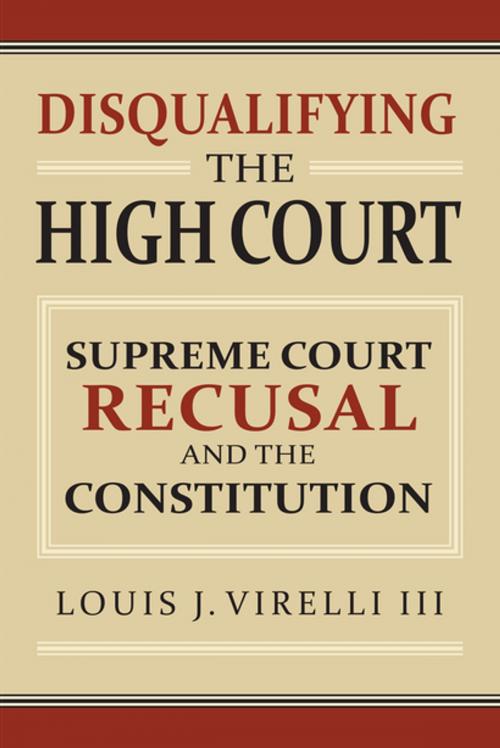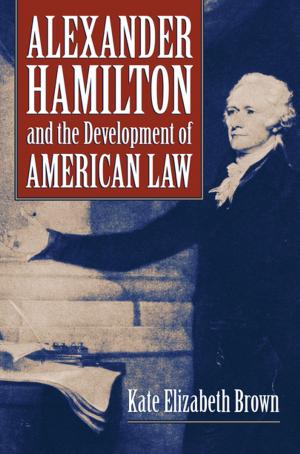Disqualifying the High Court
Supreme Court Recusal and the Constitution
Nonfiction, Reference & Language, Law, Constitutional| Author: | Louis Virelli | ISBN: | 9780700622726 |
| Publisher: | University Press of Kansas | Publication: | June 3, 2016 |
| Imprint: | University Press of Kansas | Language: | English |
| Author: | Louis Virelli |
| ISBN: | 9780700622726 |
| Publisher: | University Press of Kansas |
| Publication: | June 3, 2016 |
| Imprint: | University Press of Kansas |
| Language: | English |
Since at least the time of Justinian—under statutes, codes of judicial ethics, and the common law—judges have been expected to recuse themselves from cases in which they might have a stake. The same holds true for the justices of the US Supreme Court. For instance, there were calls for Ruth Bader Ginsburg and Elena Kagan, both of whom had officiated at gay weddings,to recuse themselves from the recent marriage equity case, Obergefell v. Hodges. Even a case like this, where no justice bowed out, reveals what a tricky ethical issue recusal can be. but as Louis J. Virelli demonstrates in this provocative work, recusal at the Supreme Court also presents questions of constitutional power. Disqualifying the High Court shows that our current understanding of how and when justices should recuse themselves is at odds with our constitutional design.
Viewing recusal through a constitutional lens, Virelli reveals new and compelling information about how justices should decide recusal questions and, in turn, how our government should function more broadly. Along the way he traces the roots and development of federal recusal law in America from as early as the Roman Empire up to the present day. The Supreme Court’s unique place at the top of the judicial branch protests the justices from some forms of congressional interference. Virelli argues that constitutional law, in particular the separation of powers, prohibits Congress from regulating the recusal practices of the Supreme Court. Instead those decisions must be left to the justices themselves, grounded in the principles of due process—assuring parties fair treatment by the judicial system—and balanced against the justices’ rights to free speech.
Along with the clarity it brings to this highly controversial issue, Virelli's work also offers insight into constitutional problems presented by separation of powers. It will inform our evolving understanding of theory and practice in the American judicial system.
Since at least the time of Justinian—under statutes, codes of judicial ethics, and the common law—judges have been expected to recuse themselves from cases in which they might have a stake. The same holds true for the justices of the US Supreme Court. For instance, there were calls for Ruth Bader Ginsburg and Elena Kagan, both of whom had officiated at gay weddings,to recuse themselves from the recent marriage equity case, Obergefell v. Hodges. Even a case like this, where no justice bowed out, reveals what a tricky ethical issue recusal can be. but as Louis J. Virelli demonstrates in this provocative work, recusal at the Supreme Court also presents questions of constitutional power. Disqualifying the High Court shows that our current understanding of how and when justices should recuse themselves is at odds with our constitutional design.
Viewing recusal through a constitutional lens, Virelli reveals new and compelling information about how justices should decide recusal questions and, in turn, how our government should function more broadly. Along the way he traces the roots and development of federal recusal law in America from as early as the Roman Empire up to the present day. The Supreme Court’s unique place at the top of the judicial branch protests the justices from some forms of congressional interference. Virelli argues that constitutional law, in particular the separation of powers, prohibits Congress from regulating the recusal practices of the Supreme Court. Instead those decisions must be left to the justices themselves, grounded in the principles of due process—assuring parties fair treatment by the judicial system—and balanced against the justices’ rights to free speech.
Along with the clarity it brings to this highly controversial issue, Virelli's work also offers insight into constitutional problems presented by separation of powers. It will inform our evolving understanding of theory and practice in the American judicial system.















